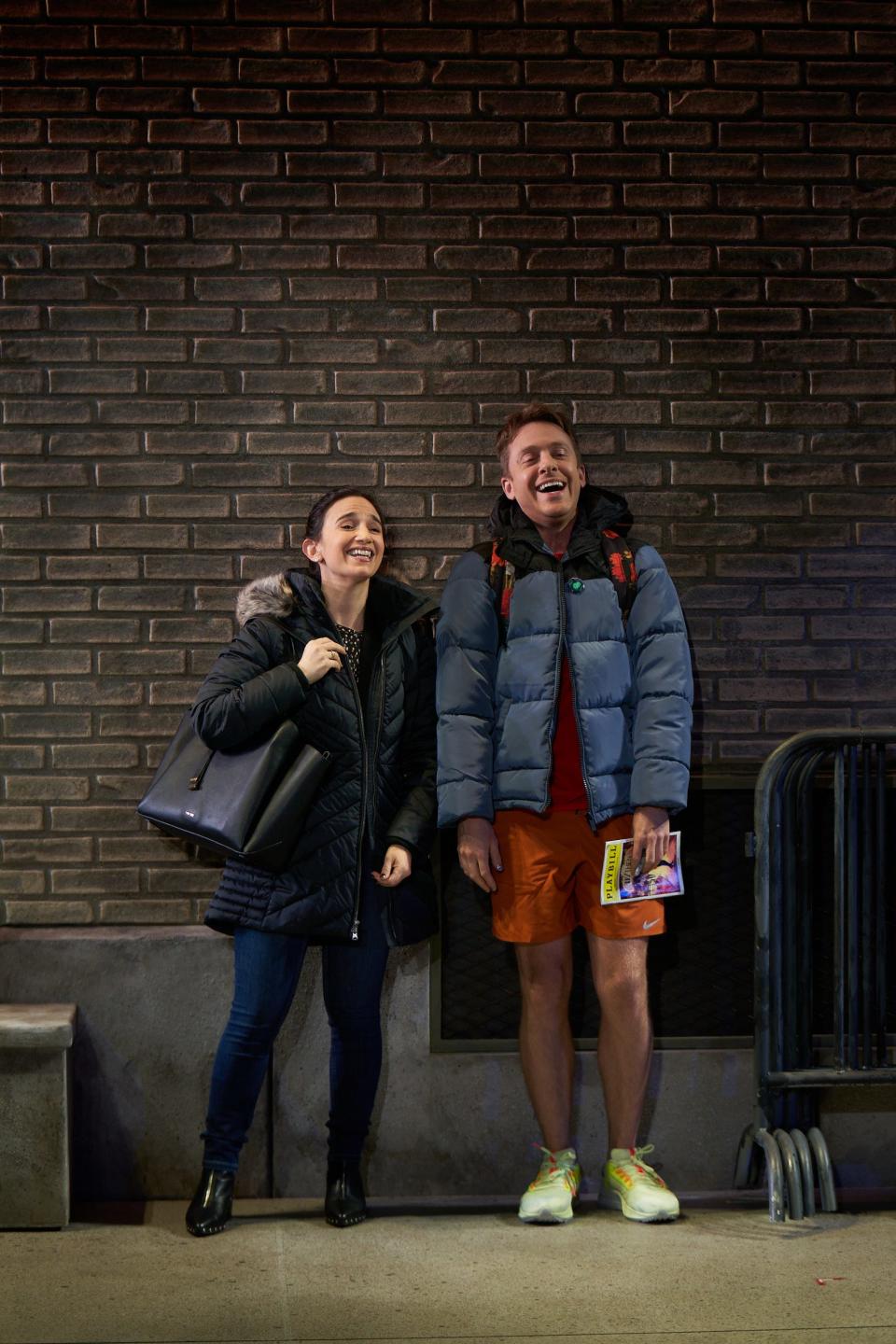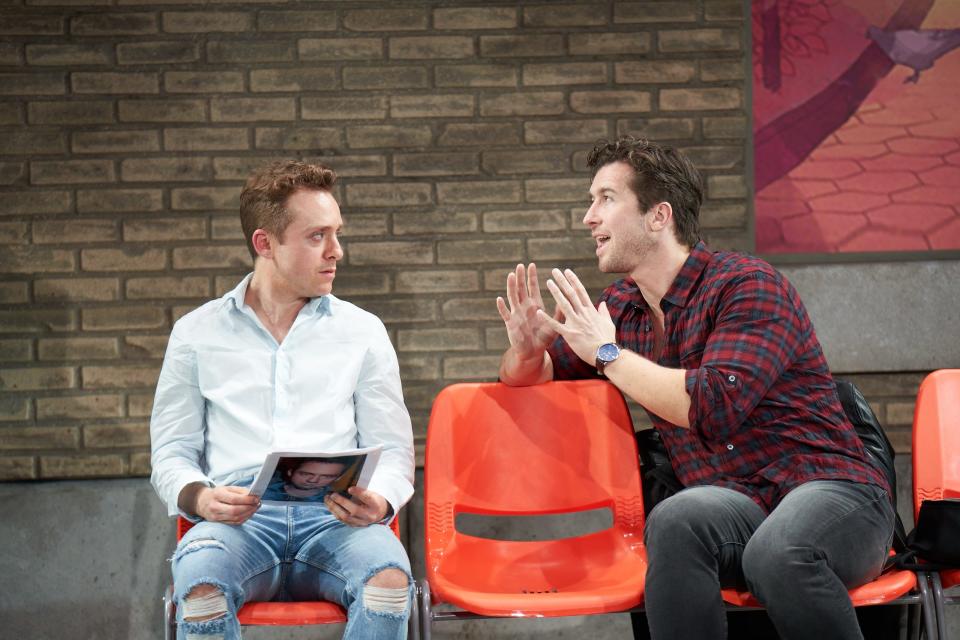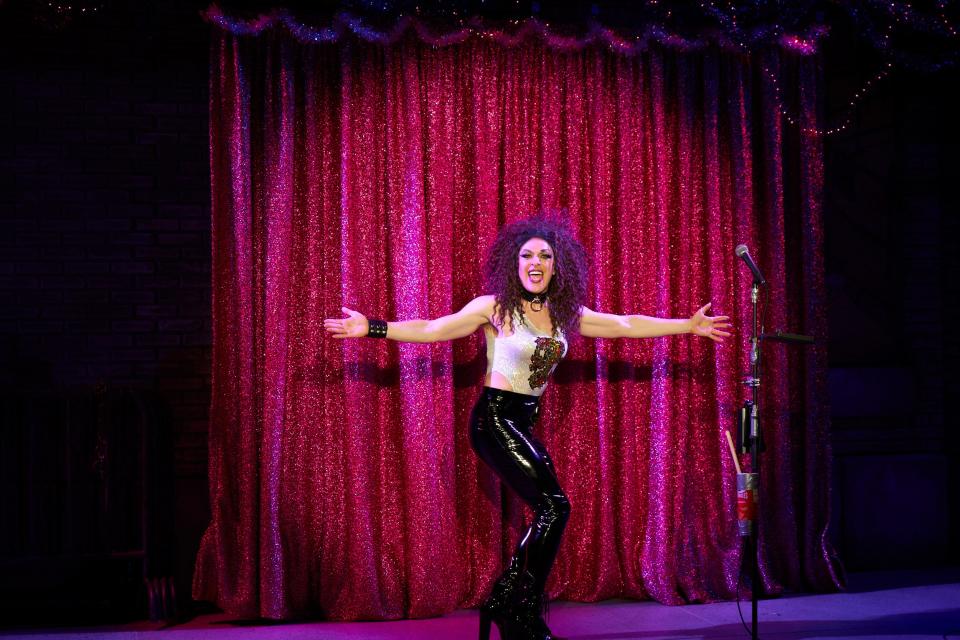'Which Way to the Stage' examines gender, sexuality, drag - and the aura of Idina Menzel
Audience members often walk into MCC Theater's "Which Way to the Stage" thinking they know what to expect.
Starting off set outside the Richard Rodgers Theatre stagedoor during the run of "If/Then" on Broadway, two friends wait for an elusive autograph, comedically debating the best Mama Rose and other "theater kid" arguments.
And then suddenly everything changes, morphing into a show delving into gender, into identity, into the real-world harshness of show business, into sexuality, into drag.
Off-Broadway: Rediscovered Holocaust letters lend twists, depth to 'The Lucky Star'
Bird's-eye view: 'Peter & the Wolf' homage from Isaac Mizrahi coming to Guggenheim
And those surprise twists can, in a way, be related to the woman who looms large (literally and figuratively) over the off-Broadway show — Idina Menzel.
"You don't expect that voice to come out of her. You feel like you know her and I think that's what's kind of shocking about her. Her star power takes you by surprise, very similar to the way the play takes you by surprise," says Sas Goldberg, who plays Judy.

"I have this great line referring to Idina Menzel: 'She had a normal life set on fire.' And that is kind of the play (Ana Nogueira) wrote — it feels like it's about one thing and then she lights it on fire."
Why Menzel?
"She's a real person who just happens to be a Broadway icon. She is disarmingly herself in every capacity, in every scenario," said Max Jenkins, who plays Judy's best friend Jeff. "And for that reason, she's the most vivid and iconoclastic Broadway performer of my generation. She made it really cool to be a Broadway star again."
Jenkins says the way the show unfolds helps bring true feeling to his performance.
"The emotion of it catches me off guard even nightly, because you're just seeing such a normal day in these people's lives, that for it to take this left turn into absolute life-changing confrontation is really easy to act because it feels like it feels earth-shattering," he said.
Genesis at brunch
Nogueira was at brunch with Goldberg and others when the inspiration for the piece struck.
"Halfway through the conversation, none of us were talking about it like an idea for a play, it kind of just hit me like 'wow, these two people waiting for this autograph.' And I knew how the first scene would end in that moment. I just saw it."
After she set the idea aside for a while, when she returned to it, "the play really poured out of me, just from that initial thought about two best friends at the stage door at 'If/Then.'"
The way it branched out into sexuality, identity, chasing a performing arts career and drag happened organically, Nogueira said.
"I guess somewhere in the back of my mind, I knew that this was going to be about identity for these two characters, and then the rest of it really just came out while I was writing. That's the beauty of writing, you don't really plan that much. And you can surprise yourself."
She says she could not be more thrilled with how the piece has come to life, as well as how it has been received by audiences.
"It's really rare that you feel like what you were hoping and dreaming something could be when you're writing it shows up on stage. Usually it's like you have to squint to see what you were hoping for," Nogueira said. "And with this, it's like 'oh, there it is. That's exactly what I was wanting.' And then at the same time, the cherry on top is that I feel like the actors are doing stuff that I never thought possible."

The world of 2015
The play is firmly set in 2015, which while not seemingly long ago, pre-dates many of the current conversations surrounding gender and identity.
"One thing that happened in a long-term sense is that our conversations around gender have changed so much. And so, in some ways, we've had to tweak some of the language," Nogueira said. "We had a wonderful gender consultant and dramaturg on our show and they were so fantastic about helping me to hone some of the language around gender identity to make sure that we weren't saying anything that we didn't mean. And then at the same time, we had to make sure that our characters were being appropriate for what people would say in 2015. They can't be having 2022 conversations in 2015."
Embraced by drag community
The play delves into drag, exploring the artform for the way it can provide freedom in a way that not being in character cannot do. But it also challenges its drawbacks, and the potential for it to feel exploitative.

Those criticisms, along with the way it also looks at the theater world with a wary eye at times, is key, Nogueira says.
"I hope it does function this way, that it shows part of loving something is being able to criticize it. And that's true of the friendships in the show and some of the romantic relationships in the show. It's true for these characters' relationship to Broadway and musical theater and it's also true with their relationship to drag. To love something deeply you have to be honest about some of the mistakes that it can make — they come from such a place of love that it's 'I want I want you to be better because I love you,'" she said.
It also provided "the most terrifying night of my life" for Jenkins, who attended "drag camp" with Goldberg before the two performed at the gay bar Hush without the context of the show. Goldberg described the evening as "terrifying" and "euphoric."
"We just kind of crossed our fingers and had a nice cry afterwards, but actually it turned out quite well because the 'Drag Race' crowd was there and they were primed and ready and really generous," Jenkins said.
Support from the drag community has continued throughout the show's run.
Continuing conversations
Jenkins says the play stands to open conversations.
"The energy I get back from the audience is a complete conversation. It's a really nuanced dialogue that I have with the audience. And I think the best thing about this play is that there are no answers. They're just questions and I think I just want people to walk away asking those questions and talking about it with their friends."
Goldberg also said she hopes the conversations sparked continue.
"I hope people are walking away with a new understanding of theater people. I hope they're walking away with questions, more than anything. Their own relationship to their sexuality or their experience with gender within the world. I know it has for me. So I hope people are walking away with the same sort of questions that I'm walking away with every night," she said.
As the show's run comes to an end (performances through Sunday, June 5, at MCC Theater, 511 W. 52ns St.), Jenkins says he hopes it lives on, to further the dialogues it's started.
"I want these conversations to continue. So I hope we get the opportunity to continue to do performances of this play, (now) or somewhere else down the line. I just really hope that it has a life," he said.
For more information, visit mcctheater.org/tix/whichwaytothestage.
Ilana Keller is an award-winning journalist and lifelong New Jersey resident who loves Broadway and really bad puns. She highlights arts advocacy and education, theater fundraisers and more through her column, "Sightlines." Reach out on Twitter: @ilanakeller; ikeller@gannettnj.com
This article originally appeared on Asbury Park Press: Which Way to the Stage on gender, sexuality, drag - and Idina Menzel

